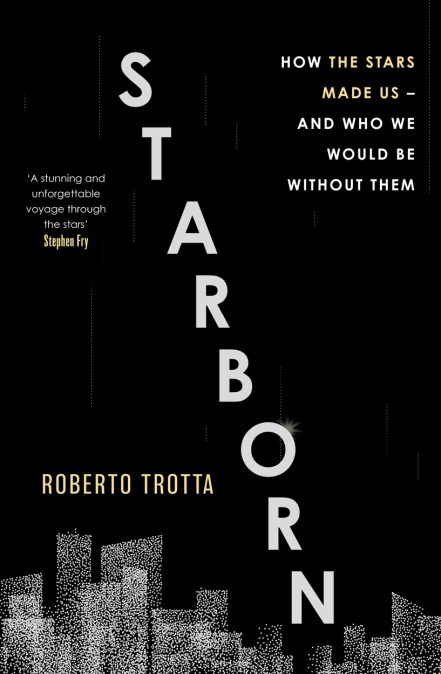A BBC RADIO 4 BOOK OF THE WEEK
Gold Winner of the 2025 Nautilus Book Awards
‘A stunning and unforgettable voyage through the stars. Almost every page will make you gulp in astonishment’ STEPHEN FRY
‘Trotta writes like a poet . . . meticulously researched, with an almost limitless archive of stellar trivia’ WALL STREET JOURNAL
A sweeping inquiry into how the night sky has shaped what it means to be human.
One of our species’ most enduring and universal relationships has been with the night sky itself – yet in the glow of today’s artificial lighting, we have forgotten this intimacy with the cosmos.
In Starborn, cosmologist Roberto Trotta reveals how stargazing has shaped the course of civilisation. Origin myths made the Sun into a life-giving creator and the Milky Way a gateway for departed souls. The motion of celestial bodies sustained the illusion that the Earth was at the centre of the cosmos – until looking at them more closely sparked the Scientific Revolution.
Across the ages, the stars have served as clocks, maps, compasses, muses, and gods, defining our laws of reality and our dreams of the sublime. How radically different would we be if we looked to the night sky and saw . . . nothing? Trotta also offers a dramatic alternate history, imagining how a world without stars would change our understanding of science, art, and ourselves.
Revealing the fundamental connections between astronomy and the story of civilisation, Starborn summons us to lose ourselves in the immeasurable vastness above – and will change how you think of the night sky forever.
Gold Winner of the 2025 Nautilus Book Awards
‘A stunning and unforgettable voyage through the stars. Almost every page will make you gulp in astonishment’ STEPHEN FRY
‘Trotta writes like a poet . . . meticulously researched, with an almost limitless archive of stellar trivia’ WALL STREET JOURNAL
A sweeping inquiry into how the night sky has shaped what it means to be human.
One of our species’ most enduring and universal relationships has been with the night sky itself – yet in the glow of today’s artificial lighting, we have forgotten this intimacy with the cosmos.
In Starborn, cosmologist Roberto Trotta reveals how stargazing has shaped the course of civilisation. Origin myths made the Sun into a life-giving creator and the Milky Way a gateway for departed souls. The motion of celestial bodies sustained the illusion that the Earth was at the centre of the cosmos – until looking at them more closely sparked the Scientific Revolution.
Across the ages, the stars have served as clocks, maps, compasses, muses, and gods, defining our laws of reality and our dreams of the sublime. How radically different would we be if we looked to the night sky and saw . . . nothing? Trotta also offers a dramatic alternate history, imagining how a world without stars would change our understanding of science, art, and ourselves.
Revealing the fundamental connections between astronomy and the story of civilisation, Starborn summons us to lose ourselves in the immeasurable vastness above – and will change how you think of the night sky forever.
Newsletter Signup
By clicking ‘Sign Up,’ I acknowledge that I have read and agree to Hachette Book Group’s Privacy Policy and Terms of Use
Reviews
A stunning and unforgettable voyage through the stars. Almost every page will make you gulp in astonishment. To be so authoritative and yet so readable and companionable, that is a rare and priceless achievement
We are in danger of losing our night skies, our first and most primal connection to the greater universe around us. Roberto Trotta's rich and poetic book is a powerful call to preservation. By tracing the intimate connections between human history and the stars above, he reminds us that the skies are not only filled with beauty, but also with meaning and promise
The most universal feature of our environment, the starry sky has been wondered at by all human societies since prehistoric times. Roberto Trotta draws on a trove of historical, scientific and literary sources to reveal the often-surprising influences of a cosmic perspective on human lives. A fascinating book, admirable for erudition and style, that will leave readers viewing the stars with fresh eyes
Stimulating and sobering, a very readable inquiry into the night sky with a broad sweep
A sweeping tour of humanity's relationship with the night sky, Starborn soars from the historical to the personal. Trotta reveals how our lives are intertwined with the stars, from the exploration of our own planet and the birth of the sciences to how the human gaze turned inward. He also offers fantastical vignettes of what might have been - imagining a world without the heavens - and a clear-eyed view of humankind's current and future connection with Earth and the cosmos
Who would've thought the stars were so decisive for humanity? Fascinating and wondrous, the untold starry tale of how we came to be and a stark warning of the starless desolation ahead, should we be unwise enough to neglect our cosmic heritage
A fascinating insight into how and why the study of the stars has been central to the human story, and a book for anyone who cares about human culture and where it will be heading next
Trotta writes like a poet, suffusing fact-dense pages with heart and even ardor. Starborn presents an engaging cultural history, salted with well-placed literary reference . . . accessible and enjoyable . . . meticulously researched, with an almost limitless archive of stellar trivia
Beautifully written
Beautifully written and intensely personal, Trotta has produced the perfect
guide to how the star-speckled sky has shaped the human story. A
lyrical hymn to the cosmos and our intimate connection to the heavens
In Starborn our relationship to the stars is rendered almost as a love story. What and who would we be, it asks, without the pulse of the stars above us? In its weaving of factual precision and intrepid invention, it's a masterwork - vast, deep and soulful
Roberto provides the poetry that comes with profound questions
of astronomy - his contemplation of darkness is illuminating

